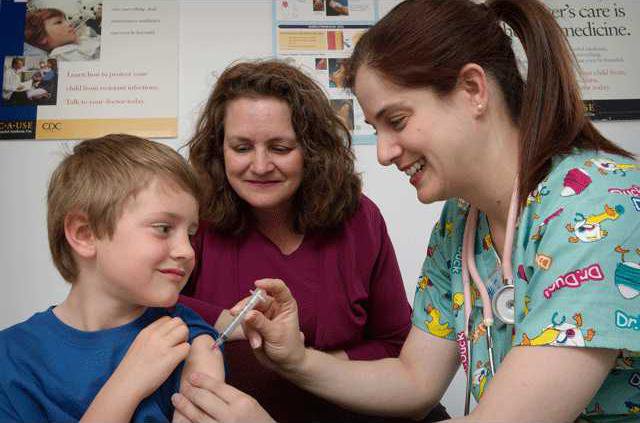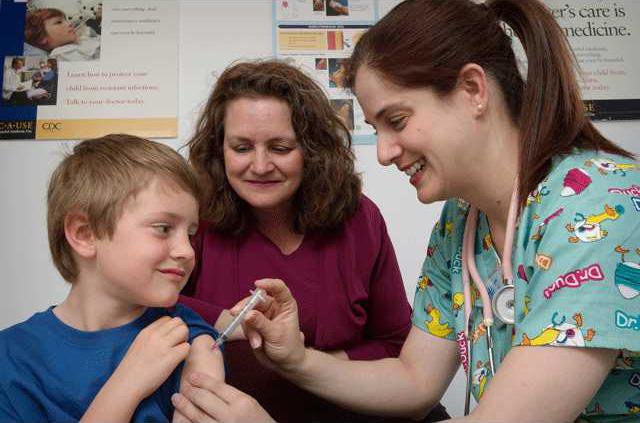With the last day of school little more than a month away, most parents and students aren’t thinking about immunizations. But it’s not too early for school nurses and the Barton County Health Department to begin planning for fall. Public Health Nurse Melissa Hegerman shared some recent changes in immunization requirements.
For the 2013-2014 school year, Kansas is phasing in three new requirements that affect how and win vaccinations are given for polio, varicella and tetanus-diphtheria-pertussis (Tdap/Td).
Polio
Depending on the age and interval between shots, children entering kindergarten through second grade may need either three or four doses.
“It’s pretty confusing,” Hagerman said. “Providing an up to date immunization record can really help.”
There should be a four week minimum interval between the first three doses and a six month interval between the third and final dose, she said. However, three doses are acceptable if there were at least four weeks between the first two doses, and at least six months between the last two doses, and one dose was administered after the fourth birthday.
For students entering grades three through 12, if they’ve received four doses with a minimum of four weeks in between each, that is acceptable regardless of the age given. They also meet requirements if they’ve received three doses, with one given on or after their fourth birthday and four weeks minimum in between each.
Chicken Pox
For students entering Kindergarten through second grade, two doses of the Varicella vaccine are required. The same goes for students in grades seven through nine. For students entering fifth and sixth grades, as well as those entering grades 10 -12, only one dose is required. Varicella is more commonly known as “chicken pox”. Once only recommended, some children may not have received this vaccination yet. If students have a notice signed by a physician verifying they have had the disease, the requirement is waived.
Keeping tetanus and “whooping cough” at bay
In the coming school year, all students entering grades seven through 12 will be required to have a single dose of Tdap, which will protect them against contracting tetanus or diphtheria, and will also protect unvaccinated children from contracting Pertussis, or “whooping cough”, which has recently been on the rise throughout the country.
For adults, Hegerman recommends getting TDaP, to help keep pertussis and whooping cough at bay, especially if time is spent around babies and toddlers.
Others
Some vaccines that are not required for school, but are highly recommended protect children from contracting meningitis, genital warts and cervical cancer.
Meningococcal vaccine is recommended for children ages 11-12, and should be followed up with a booster between the ages of 16 and 21, according to the Centers for Disease Control. In 2005, it was believed the vaccine could last up to 10 years, but more recently its been found to fade in effectiveness in five years. The adolescent and early adult years are also the most vulnerable years for contracting the disease,
“In adolescents, those ages 16 through 21 years have the highest rates of meningococcal disease,” information on the CDC website says. “Even though the disease is not very common, we want to prevent as many adolescents as possible from getting it. Meningococcal bacteria can cause severe disease, including meningitis and sepsis, resulting in permanent disabilities and even death.”
Another important vaccine to consider, according to Hegerman, is the HPV vaccine is recommended for both boys and girls, ages 9-26. HPV, or human papilloma virus, is transmitted through sexual intercourse. The vaccination is only a preventative measure and is only licensed for people between the ages of 9 and 26 years. It is not a cure. In fact, there is no cure, only treatment, and that is why it is recommended children receive the vaccine before they become sexually active. It is also not yet required for Kansas students, but several bills in the state legislature have appeared in the years since 2007, when the vaccine became widely available. It was once only recommended for girls, but now the CDC recommends it for both boys and girls.
Boys can both carry the disease, and can become infected with genital warts. In girls, the virus causes genital warts and cervical cancer, which is the second leading type of cancer in women.
School nurses have already begun checking through student immunization records and made preparations for sending written notice to parents about what requirements their students will need to meet before classes begin in the fall, Hegerman said. The Barton County Health Department will be ready, she said.
Immunization requirements to change for 2013-2014 school year





